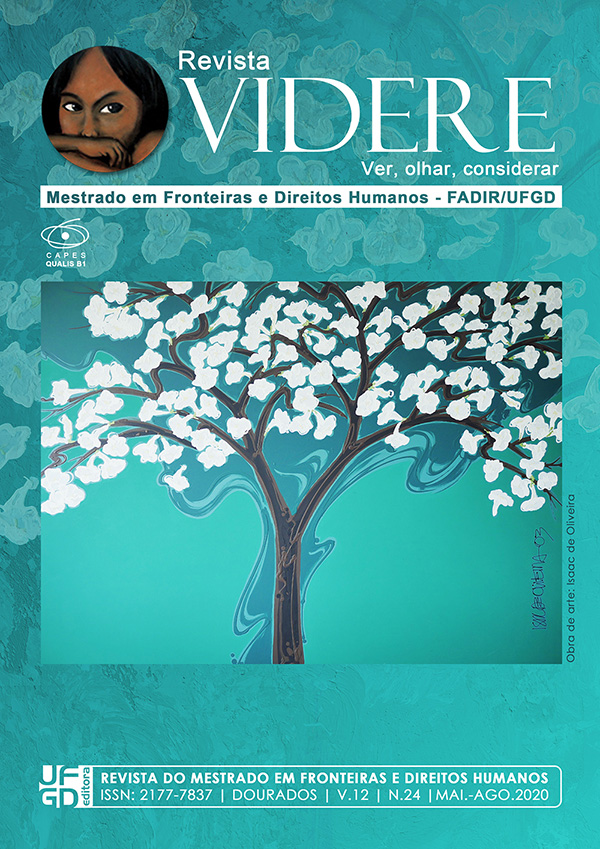A violação de direitos da personalidade do autor pela prática do ghost writer
DOI:
https://doi.org/10.30612/videre.v12i24.9953Palabras clave:
Direitos da personalidade. Direito de autor. Direito moral de autor. Direito ao reconhecimento da autoria. Ghost writer.Resumen
O presente artigo realiza um breve estudo sobre o regime jurídico do direito ao reconhecimento da autoria e a figura do ghost writer no direito brasileiro. Para tanto, faz uso das decisões judiciais proferidas no caso Bruna Surfistinha, as quais discutiram a autoria da obra literária “O Doce Veneno do Escorpião”, que relata a vida da personagem Bruna Surfistinha. Trata-se de pesquisa que utiliza metodologia descritiva, baseada fundamentalmente na investigação bibliográfica, o que é feito para analisar a solução judicial dada ao caso objeto do estudo. Os temas mais relevantes da matéria são debatidos, como o direito ao reconhecimento da autoria, a obra protegida pelo direito de autor, bem como as convenções envolvendo a figura do ghost writer. Merece ainda destaque a apresentação de breves notas acerca do problema do ghost writer na Alemanha e na França. Assim sendo, o objetivo desse trabalho é discutir se a solução judicial dada ao caso Bruna Surfistinha foi a mais adequada, considerando o direito de autor, o direito ao reconhecimento da autoria e as convenções de ghost writer.Descargas
Citas
ASCENSÃO, José de Oliveira. Direito autoral. 2. ed. Rio de Janeiro: Renovar, 2007.
BRASIL. Superior Tribunal de Justiça. Recurso Especial nº 1387242 2012.01.62477-2. Relator: Min. Paulo de Tarso Sanseverino. Brasília, 19 fev. 2015. Disponível em: https://scon.stj.jus.br/SCON/jurisprudencia/toc.jsp?processo=1387242&b=ACOR&thesaurus=JURIDICO&p=true. Acesso em: 9 dez. 2019.
BRASIL. Tribunal de Justiça de Minas Gerais. AC: 10570110000033002. Relator: Luiz Carlos Gomes da Mata. Belo Horizonte, 2 fev. 2016. Disponível: em:
BRASIL. Tribunal de Justiça de São Paulo. Apelação nº 0181194-46.2008. Relator: Des. Coelho Mendes. São Paulo, 5 abr. 2011. Disponível em: https://esaj.tjsp.jus.br/cjsg/getArquivo.do?cdAcordao=5075844. Acesso em: 9 mar. 2019.
CHINELLATO, Silmara Juny de Abreu. Direito de autor e direitos da personalidade: reflexões à luz do Código Civil. Tese para Concurso de Professor Titular de Direito Civil da Faculdade de Direito da Universidade de São Paulo. São Paulo: Universidade de São Paulo, 2008.
CUPIS, Adriano de. Os direitos da personalidade. Trad. Afonso Celso Furtado Rezende. Campinas: Romana, 2004.
DIETZ, Adolf; PEUKERT, Alexander. § 15, § 16 A, B, E und F, § 17. In: LOEWENHEIM, Ulrich (Hrsg.). Handbuch des Urheberrechts. 2. ed. München: C. H. Beck, 2010, p. 236-255.
DIETZ, Adolf; PEUKERT, Alexander. Vor §§ 12 ff., §§ 12-14, 42. In: SCHRICKER, Gerhard; LOEWENHEIM, Ulrich (Hrsg.). Urheberrecht: Kommentar. 4. ed. München: C. H. Beck, 2010, 862-874.
DIETZ, Claire. Rechte des Urheber: Urheberpersönlichkeitsrecht. In: WANDTKE, Artur-Axel (Hrsg.). Urheberrecht. Berlin: De Gruyter, 2009, p. 90-105.
GAUTIER, Pierre-Yves. Propriété littéraire et artistique. 7. ed. Paris: PUF, 2010.
LETTL, Tobias. Urheberrecht. München: C.H.Beck, 2008.
LIPSZYC, Delia. Derecho de autor y derechos conexos. Buenos Aires: UNESCO, 1993.
LUCAS, André; LUCAS, Henri-Jacques. Traité de la propriété littéraire et artistique. 3. ed. Paris: Litec, 2006.
LUCAS-SCHLOETTER, Agnès. Droit moral et droits de la personnalité: étude de droit compare français et allemand. Aix-en-provence: PUAM, 2002.
MORAES, Walter. Questões de Direito de Autor. São Paulo: Revista dos Tribunais, 1977.
OSENBERG, Ralph. Die Unverzichtbarkeit des Urheberpersönlichkeitsrechts. Freiburg: Hochschulverlag, 1985.
POLLAUD-DULIAN, Frédéric. Le droit d’auteur. Paris: Economica, 2005.
PONTES DE MIRANDA, Francisco Cavalcanti. Tratado de direito privado. Campinas: Bookseller, 2000, t. VII.
REHBINDER, Manfred. Urheberrecht. 16. ed. München: C. H. Beck, 2010.
SCHACK, Haimo. Urheber- und Urhebervertragsrecht. 5. ed. Tübingen: Mohr Siebeck, 2010.
SCHMID, Matthias; WIRTH, Thomas; SEIFERT, Fedor. Urheberrechtsgesetz mit Urheberrechtswahrnehmungsgesetz: Handkommentar. 2. ed. Baden-Baden: Nomos, 2009.
STOLZ, Hansjörg. Der Ghostwriter im deutschen Recht. München: C.H. Beck, 1971.
STROWEL, Alain. Droit d’auteur et copyright: divergences et convergences. Paris: LGDJ, 1993.
VIVANT, Michel; BRUGUIÈRE, Jean-Michel. Droit d’auteur. Paris: Dalloz, 2009.
WANDTKE, Artur-Axel. Urhebervertragsrecht. In: WANDTKE, Artur-Axel (Hrsg.). Urheberrecht. Berlin: De Gruyter, 2009, p. 133-185.
ZANINI, Leonardo Estevam de Assis. Direito Civil: Direito das Coisas. Rio de Janeiro: Lumen Juris, 2019.
ZANINI, Leonardo Estevam de Assis. Direito de autor. São Paulo: Saraiva, 2015.
ZANINI, Leonardo Estevam de Assis. Direitos da personalidade. São Paulo: Saraiva, 2011.
Descargas
Publicado
Cómo citar
Número
Sección
Licencia
Os autores devem aceitar as normas de publicação ao submeterem a revista, bem como, concordam com os seguintes termos:
(a) O Conselho Editorial se reserva ao direito de efetuar, nos originais, alterações da Língua portuguesa para se manter o padrão culto da língua, respeitando, porém, o estilo dos autores.
(b) Autores mantém os direitos autorais e concedem à revista o direito de primeira publicação, com o trabalho simultaneamente licenciado sob a Atribuição-NãoComercial-CompartilhaIgual 3.0 Brasil (CC BY-NC-SA 3.0 BR) que permite: Compartilhar — copiar e redistribuir o material em qualquer suporte ou formato e Adaptar — remixar, transformar, e criar a partir do material. A CC BY-NC-SA 3.0 BR considera os termos seguintes:
- Atribuição — Você deve dar o crédito apropriado, prover um link para a licença e indicar se mudanças foram feitas. Você deve fazê-lo em qualquer circunstância razoável, mas de nenhuma maneira que sugira que o licenciante apoia você ou o seu uso.
- NãoComercial — Você não pode usar o material para fins comerciais.
- CompartilhaIgual — Se você remixar, transformar, ou criar a partir do material, tem de distribuir as suas contribuições sob a mesma licença que o original.
- Sem restrições adicionais — Você não pode aplicar termos jurídicos ou medidas de caráter tecnológico que restrinjam legalmente outros de fazerem algo que a licença permita.



















